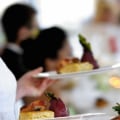Working in the food and beverage industry can be a great opportunity to acquire a wide range of skills, such as logical thinking, good communication, creativity, teamwork and leadership. Before going to an interview, it is important to do your research and find out what the company is selling and how your skills could be adapted to their needs. Visiting the restaurant, studying the menu and even ordering and eating a meal can help you get a better understanding of the place. It is also important to observe the atmosphere of the restaurant, how the staff interacts with each other and if you feel like you would fit in.
Doing your homework about the prospective employer will make them see that you are interested in the job and committed to the new employer. When answering questions during an interview for a position in the food service industry, it is important to use specific examples from one of your previous jobs that relate directly to the type of work you'll be doing in the new position. Managers want to hire candidates who meet the requirements of the position and have a good work ethic and can handle stress. The fast food service industry can be a great opportunity for students looking for extra money, additional income or those looking to enter this field for the first time.
Fast food service jobs require interpersonal skills and excellent communication, which can be difficult to assess through a resume or cover letter. During the pandemic, working in this industry has presented several additional challenges such as compliance with wearing masks, increased exposure to coronavirus, reduced shifts or hours, reduced salaries and changes in how restaurants serve their customers. Many restaurants are making changes to support the talent shortage, both for experienced professionals and those looking for their first job in this field. It is important to prepare answers ahead of time to common questions asked during interviews.
Employers are also following local COVID protocols as well as state and national ones, which include masks for staff and full sanitation of all work and service areas. Working long hours on your feet, dealing with difficult customers and keeping up with the fast pace of lunch and dinner rush hour can make food service jobs difficult, many of which pay little with few benefits. Both during and before the onset of the new coronavirus, working in this industry presents specific challenges that make work physically and mentally demanding. Overall, working in the food service industry can be a great opportunity for those looking for extra money as a student or additional income or those looking to enter this field for the first time.
It can help develop related skills such as customer service, communication and working well in a fast-paced environment. Although it has its ups and downs, many people love it.









